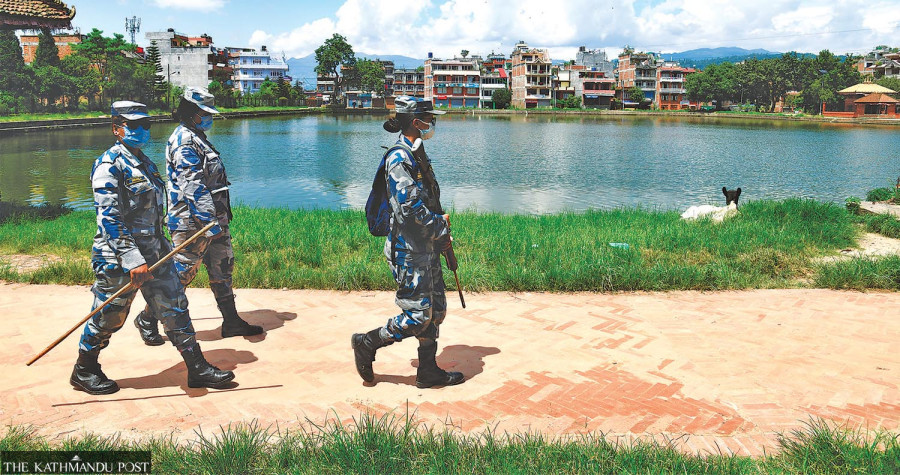National
Federal government overlooks statute as it wants to oversee Valley’s security
Nepali Congress and CPN-UML are in favour while the Maoists are against the proposed arrangement.
Binod Ghimire
The authority to maintain law and order at the provincial level falls under the jurisdiction of the provincial government.
Schedule 6 of the Constitution of Nepal has clear mention of provincial police. Similarly, Article 268(2) of the constitution envisions that each province will have its own police force to maintain law and order in the province.
The Nepal Police and Provincial Police (Operation, Coordination and Supervision) Act was promulgated in 2019 which internalised what the constitution envisioned.
However, even before the Act came into force, the erstwhile KP Sharma Oli government in September 2020 issued an ordinance to amend the Act bringing the security of the three districts of the Kathmandu Valley under the purview of the federal government. Despite reservations from the Bagmati provincial government, the government issued the ordinance which said the security of Kathmandu, Lalitpur and Bhaktapur districts will be overseen by the Nepal Police while also investigating criminal offenses committed in the districts.
The ordinance lapsed because it didn’t get through the parliament. However, the Sher Bahadur Deuba government again issued the ordinance on April 5. A bill to replace the ordinance is being discussed in the State Affairs and Good Governance Committee of the House of Representatives.
As the discussions head towards conclusion, parties are sharply divided over the provision, which contradicts the constitution. CPN-UML and Nepali Congress lawmakers argue that the federal police must get the authority to manage the security of the federal capital, given its security sensitivity.
“Considering the security sensitivity of the federal capital, the federal police should be allowed to look after the three districts,” Dila Sangraula, a Congress lawmaker who is a member of the committee, said during discussions on Tuesday. “This shouldn’t be taken as a breach of provincial jurisdictions.”
However, CPN (Maoist Centre) has firmly stood against the provision arguing that it contradicts the constitution.
The party’s lawmakers have registered an amendment demanding that the Bagmati Provincial government should be allowed to manage the security in Kathmandu Valley.
“The federal police units will oversee the security in the Valley if the bill is endorsed,” said Amrita Thapa, a Maoist Centre lawmaker who has registered an amendment to the bill. “This is unconstitutional. It curtails the constitutional authority of the provincial government.”
The Bagmati Province government had warned the Oli government against introducing the ordinance. Shalikram Jammarkattel, the minister for economic affairs and planning who was internal affairs minister of the province then, said Oli and Ram Bahadur Thapa, the then home minister, didn’t listen to him. “The federal government is breaching the constitution to consolidate power,” he told the Post. “The present government is repeating what the Oli government had done.”
The provincial governments have taken the issue seriously. According to Krishna Khanal, internal affairs and law minister of the Bagmati Province, a meeting of the internal affairs ministers of all the provinces that will take place for three days starting Wednesday will discuss the issue along with others. “The federal government cannot make any law in breach of the constitution. Our meeting will discuss the issue and the reluctance of the federal parliament to bring other laws necessary to execute federalism,” Khanal told the Post. “We will devise our future course based on the conclusion of the meeting. We firmly stand against such unconstitutional moves.”
Constitutional experts say in federal countries there are separate security arrangements for the federal capital. However, such arrangements are governed by the law or the constitution. “There are separate security arrangements for the capital city in many countries. However, our constitution clearly gives the provincial government the authority to handle the security of the Capital,” Dinesh Tripathi, a senior advocate who specialises on constitutional law, told the Post. “It will be unconstitutional to bring the entire security of the three districts within the ambit of federal police.”
Experts say the constitution gives the federal police the authority to make security arrangements in the entities under the federal government, to provide security to senior officials and other crucial infrastructures, but the responsibility of day to day security comes under the jurisdiction of provincial governments.
“The federal government has been demonstrating a centralised mindset on several occasions. This is yet another instance of that mindset,” Mohan Acharya, a constitutional lawyer, told the Post. “How can the federal government make a law contradicting the constitution?”
If the federal government wants the federal police to handle the Capital’s security, then the constitution should be revised to bring the three districts under the federal government’s jurisdiction, according to experts.
However, some experts say there should not be a problem in allowing the federal police to oversee the security of Kathmandu through a special legal arrangement. “Although it might look contradictory, there are such arrangements in many countries. I don’t see it as problematic,” Tulasi Simkhada, a constitutional lawyer, told the Post. “This, however, could be challenged at the Supreme Court even after its endorsement by the federal parliament.”
The House committee is working to conclude the discussion on Thursday and forward to the lower house for endorsement. “We will make maximum efforts to approve it through consensus,” Babita Mishra, secretary at the parliamentary committee, told the Post. “In case of no consensus, some lawmakers will write notes of dissent.”




 18.12°C Kathmandu
18.12°C Kathmandu














